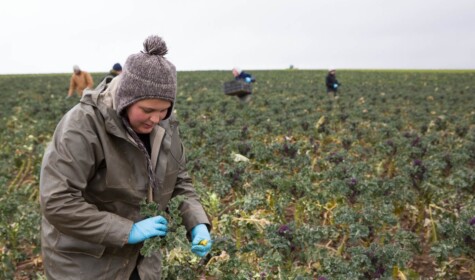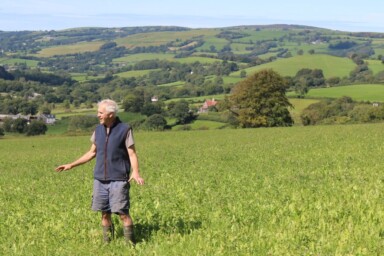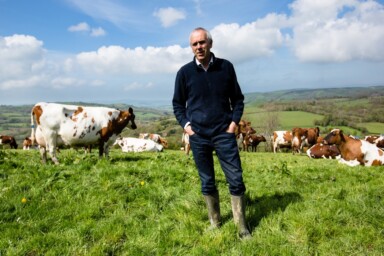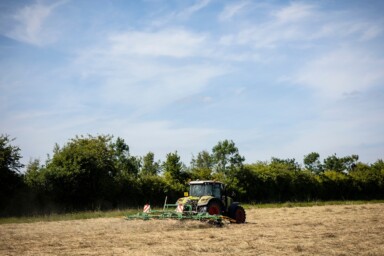In a world where most of us buy our food from big food retailers with global supply chains, and governments set the policy framework, it might not seem that local authorities have much of a role to play in our food system. However, they still have control of the ‘old infrastructure’ of markets, food safety inspections and roads, and they have much responsibility for food and food production, including school meals, meals on wheels and the provision of allotments. They are also the voice of local food, reporting back to national government, and they have a role in maintaining public trust.
Local government is therefore well placed to take a lead on local food security. That was the argument put forward by Tim Lang and others in a paper on why local authorities should prepare food plans for Brexit, recommending the creation of Food Resilience Teams that would conduct audits and make risk assessments, consulting with appropriate food-related professional bodies as well as local interests. Written in 2018, when concern was growing about the impact of a no-deal Brexit on food supply chains, it now reads as a dress rehearsal for the actual calamity that is COVID-19.
The rush on seeds, compost and local veg box delivery schemes that followed lockdown was a sign of public anxiety about the reliability of their food supply. For some, the threat was more psychological than real, as supermarket supplies are now returning to normal, but it does raise real questions about our dependency on imports. Meanwhile, for others, the loss of paid work and the requirement for some to self-isolate, has meant problems with shopping or paying for food.
Local authorities are at the forefront of responding to these concerns. In rural mid-Wales for instance, staff at Ceredigion County Council are making 1700 telephone calls every week to people judged to be at special risk and redeploying staff to cover essential functions. They are also working with the county’s food banks to monitor hardship and find long-term solutions to poverty – demand for emergency food parcels in Aberystwyth, the biggest town in the county, has gone up by 50% since the lockdown began – and the Council are in negotiations to provide more community spaces in which to grow food. The twice-monthly farmers’ market in Aberystwyth has been reinvented with Council support as an online hub, with collection at fixed time slots and with social distancing ensured. Meanwhile, an enthusiastic response by local volunteers means that most people not already monitored by the Council’s Social Services Department are being supported by neighbours and community groups.
In some cities, more formal partnerships are proving their worth. The Sustainable Food Places project (formerly Sustainable Food Cities) has been supporting food partnerships between local authorities, other public bodies and community groups since 2013. Building on the pioneering work of earlier food councils the project takes a ‘holistic, place-based and systems approach’ to local food, and their how-to guides emphasize the need for painstaking work to build trust and identify policy areas where community groups can make a real contribution.
There are pitfalls on both sides. Community groups can be quick to notice when they are being used to plug the gaps that austerity has left in the statutory services of government, while local authority staff may be nervous about political bias or fail to appreciate the many benefits that food can have in joining up policy areas.
This work is paying off in the present emergency. Food Cardiff, for instance, which has over 30 members including public bodies, businesses and charities, was able to set up a COVID-19 Food Response Group very early on. So far, the focus has been on emergency food distribution, although they have also worked with the Council to keep the allotments open. They plan soon to support growing food at home, working, for instance, with Edible Cardiff to distribute starter kits for growing salads and herbs with the food parcels.
Food Cardiff coordinator Pearl Costello describes how this group has weekly meetings to keep everyone up to date and avoid duplication. She also explains how important the Food Cardiff partnership was in brokering relationships between the Council and local volunteers. ‘It’s not just going to the Council and saying “can you do this?”, it’s saying “we’re here as a resource”…one of the things I didn’t want it to be is quite top-down, and thankfully it’s not that. It’s about collaborating and channelling resources to where they are needed.’ Food Cardiff have issued a briefing paper for other local authorities which also recommends support for growing fresh fruit and vegetables.
It’s a similar story In London, where the Greenwich Cooperative Development Agency is working in partnership with the Royal Borough of Greenwich and Charlton Athletic Community Trust to produce 200 food boxes every week. These meet the Eatwell nutritional guidelines and include fresh produce, catering variously for vegetarians, meat eaters and those without cooking facilities. Their approach is laid out in a briefing on food for vulnerable people in lockdown produced jointly with Sustain, and again, it builds on existing relationships. A recent briefing from the FAO also points out the crucial role of local government in responding to COVID-19.
How far, though, can these partnerships go? It is significant that the list of partners in Food Cardiff includes housing associations, universities, the health board, a food bank and a community market – but no supermarkets. The big retailers do contribute to their local communities, especially in supplying surplus food and with cash sponsorship, but it is an unequal relationship which is governed as much by expediency and conditions set by Head Office than a real care for the needs of a community. Their supply chain logistics do not favour local food production, either.
Another area that is perhaps not properly included in local authority food plans is farming. Some councils do see the potential of sourcing school meal ingredients from local farms and food businesses, and the Preston model of community wealth building is well known. But when Pembrokeshire County Council put 14th century Trecadwgan Farm on the market last year, it disregarded the offer from a local group to buy it as a community farm and sold it to the highest bidder instead, on the grounds of ‘severe financial pressures’.
How could local authorities raise their game and start to shift the balance towards more local food resilience? There are a few pointers towards a more radical approach. One is the way that many have declared climate emergencies and begun to work with citizen groups to find new ways forward. Another is a Welsh initiative, the Well-being of Future Generations Act, which requires public bodies to work in a new collaborative way with community groups and businesses. This sets the scene for a social, economic, environmental and cultural transformation towards low-carbon prosperity and local resilience. Jane Davidson, one of the architects of the Act and author of a forthcoming history of it, thinks that food resilience could be a fundamental area for change.
‘COVID-19 has demanded new ways of getting food to consumers,’ she says. ‘One of the benefits has been the way in which local growers and producers have imaginatively responded to community food needs. When the immediate crisis finishes, local authorities should look to see if they could use the Well-being of Future Generations Act to require supermarkets to use more locally sourced products and thus build resilience for COVID, Brexit and climate change.’
Perhaps the disruption caused by the pandemic will allow government and citizens together to make a step change in our food?







